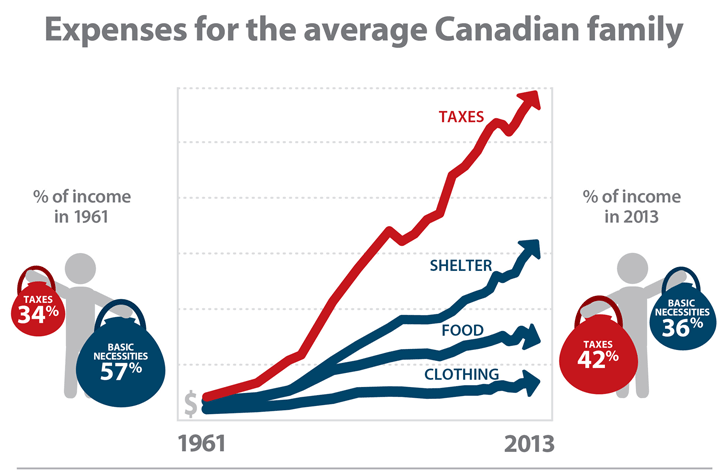TORONTO – A Fraser Institute study released Tuesday suggested the average Canadian family’s total tax bill has increased by 1,832 per cent since 1961—but many economists have pointed out potential flaws in the measurement and conclusions of the report.

The Canadian Centre for Policy Alternatives (CCPA) has criticized the Fraser Institute’s methodology in past versions of the study that suggested a similarly high increase: In 2010, CCPA’s Iglika Ivanova wrote that the problem lies with their math.
Ivanova pointed out it should be the share of family income that goes to taxes rather than the change in absolute dollars—and that arbitrarily choosing years for comparison can be problematic.
“In 1961, families paid 33.5 per cent of their income on taxes, but by 1969 they were paying 39 per cent and in 1974 they paid 43.4 per cent of their income,” she wrote.
So to compare the 2013 family tax rate—41.8 per cent of income as calculated by the Fraser report—you’ll see only an 8.3 per cent increase from 1961, and a decrease of 1.6 per cent since 1974.
“Therein lies the peril of summary statistics – calculating the percent change over time crucially depends on your starting and ending point. A few years either way would result in completely different numbers.”
Richard Ivey School of Business professor Paul Boothe said he was concerned by the inclusion of corporate tax revenues in the report.
“They make the argument that corporate taxes are eventually paid for by consumers, and that would be true if Canada were a closed economy and all markets were perfectly competitive,” he told Global News.
“But let’s say that there’s a big increase in profits by a foreign-owned company operating in Canada. So their profits go up, the Canadian taxes that they pay go up, but it doesn’t mean that their prices to Canadian consumers go up,” he said, suggesting commodities like oil don’t have their prices determined in Canada. “So it’s not passed along to consumers in terms of higher prices.”
But Boothe’s primary concern was that the study didn’t touch on the amount and quality of public services that we get for our taxes.
Press Progress pointed out there was no medicare, Canada Pension Plan, or Guaranteed Income Supplement (Old Age Security pension) back in 1961.
- ‘Shock and disbelief’ after Manitoba school trustee’s Indigenous comments
- Canadian man dies during Texas Ironman event. His widow wants answers as to why
- Several baby products have been recalled by Health Canada. Here’s the list
- ‘Sciatica was gone’: hospital performs robot-assisted spinal surgery in Canadian first
“If people wanted to go back to 1961 health care, I guess we could have a lot lower taxes, but I personally wouldn’t want to receive the care that they gave in 1961,” added Boothe. “It’s really hard to measure exactly the improvement or the increase in the public services that we receive for our taxes, but it doesn’t mean you can just ignore it.”
CCPA emphasized the share of income going towards taxes rose quickly in the 1960s and between 1976-1985, but has “hovered around 45 per cent ever since.”
The Fraser report also presented the finding that Canadians spend more on taxes than they spend on food, shelter and clothing combined in a negative light, according to University of British Columbia professor David Duff. But he says it’s a sign of progress that more money goes to taxes to pay for things like health care and higher education.
“Lesser-developed countries spend a lot on food, shelter and clothing; more developed economies spend more money—we spend more money—on these other things which are luxury goods for poorly-developed countries,” said Duff.
“So it’s completely normal and natural that as an economy develops, you’re going to spend a lot more money on these things.”



Comments